How do mental health symptoms impact/alter/inspire creative process?
13 creatives respond in their own unique ways about how the mind impacts the creative process ...
I work with artists/writers/creatives to help them understand the relationship of health to creativity in their own lives in order to achieve holistic wellness and success.
These are all excerpts from interviews that I’ve previously shared here, providing insight into the myriad ways that what’s going on in the brain, body and life impacts what we create.
Bunni: I have big issues with doing art in the sense that I always have to complete it in one sitting. This is out of a mental panic that I won’t be able to come back to it later. Sometimes even in the middle of the drawing I feel like giving up on it. When I get depressed, I don’t want to do anything for the whole time. With that playing a factor, I also hardly have time to get into my normal process of art because work makes me exhausted so often. The exhaustion coupled with the loneliness that I feel with my depression usually gets so far that I hold no place for a routine. And somehow makes my designs only able to remain in a small state.
Read Bunni’s full interview:
Kari: I find it hardest to create when I am avoiding something. There are times you aren’t quite ready to face something, or own up to your mistakes, or acknowledge some deep unexplored grief. These are times when it's good to switch gears until you’re ready to sit with what you need to explore.
Read the full interview with Kari Bentley-Quinn:
Ruthie: I tend to start doing some form of visual art when I'm in a good mental place because I get overwhelmed by getting started and the space that I'm in. My art space as it exists now is not organized and it's not a comfortable space for me--my materials are kind of just in box and I don't have them organized. And I tend to be messy in my process. I need to look at all my materials at once, try different combinations out, and live in the process. Right now, I have to sort of put everything away after I do art because the room I use is also my office and if my materials stay out and thrown everywhere I feel like I can't use it as an office.
In terms of writing, I've found I do write when I feel overwhelmed or anxious about something or something that's been on my mind. I also just write when I get the feeling I need to, and I feel it in my body. I feel less overwhelmed and anxious about writing because it's a cleaner, easier process for me and I've been doing it longer.
Read the full interview with
:Jennifer Moore: I fully believe that I do morbid art because of my depression. I've been fascinated with the darker side of our world since I was a child.
On the flip side, I enjoy color. Color makes me happy. It's two sides of the same coin, I think, really. The two aesthetics keep me in balance.
Read the full interview with
:Mark: My style of drawing changes depending on what emotions I'm feeling. I don’t draw when I’m angry because I can't concentrate or get my mind to make what I want to create at the time. You can definitely see the difference depending on my emotions. When I feel stable and happy my art looks more professional, during intense emotion it is more abstract and metaphysical stuff.Mental health symptoms decide what type of art I do. I don't use a lot of color, usually, but anytime I feel intense emotions my art becomes more abstract with less actual forms.If I'm dealing with mental health symptoms I care less what I'm drawing and I draw a lot more abstract with more cubelike, numbers show up more, or what looks like letters out of focus, and random faces in a puzzle type setting. When I'm stable pictures are more clear, more thought out and actually look like what I'm usually trying to reference.
Read the full interview with Mark:
Leon: I write regardless of how I feel, but I use my experiences in my writing. So, if I'm struggling with anxiety, I find a way to write about it. I try to find takeaways that readers can do to help themselves and then I can implement them into my life as well. Instead of the overdone and cliched "self help guru," I feel like me and my audience are learning together and figuring it out as we go along.
Read the full interview with Leon:
Peter: Most of my writing has dealt with the darker side of mental health and personal well-being. I've always written stories that are related to real life events or situations. Almost like an advanced form of a journal. … I'm honestly not sure how to separate my writing from my mental health symptoms. My writing is my mental state put into words. I'm currently working on a "fictional memoir" which focuses on remembering. I've been going to these corners of my mind that I didn't necessarily know were there. It is a form of therapy for me and it is a great challenge.
At this point in my mental health journey...and for me that's what it is, a journey … let me digress on that: It was a long road down and now I think I'm on the way up. Sometimes it does feel like one step forward, two steps back. But I try to keep the hope and positive vibes alive, even in the darkest hours I do my best to protect the flicker of a flame within myself.
So, at this point in my mental health journey, I have been striving for a true writing schedule. However, it is very difficult for me to keep that schedule at the moment. I am starting to accept that perhaps a rigid schedule is not how I work. My mood is pretty stable over the last number of years, but I still suffer from daily symptoms, which interrupt my ability to hit my goals. However, I try to be patient with myself. I'm learning everyday, which I feel is the biggest win at the moment. I recently went back to school full-time, and I must say I really killed it that first semester. It was a challenge, but it was the first time I ever finished a semester with straight A's. The following two semesters were even more of a challenge however, and I am currently looking to return to work. But I will try to tie all this rambling into a neat bow. My writing process is very "organic" and unstructured. I feed off the mood I'm in, I know no other way. It is often most difficult just starting to put words down because in my process I am always editing as I go. I am not the most efficient writer, but I enjoy my process all the same. Doesn't that matter at least a little bit? Enjoying life and enjoying the creative process.
Read the full interview with
:Russell: I'm not completely sure how it changed because I have had mental health issues for basically my whole life. It influenced things on such a deep level that I couldn't pick out exactly how it influenced anything, because it influenced everything. I have used creativity to escape my health challenges and I have used it to embrace my health challenges. Some art I've made is a primal scream of pain that I can never look at again, while others I return to all the time like a comforting blanket. Some things served me for a season, and others still serve me today.
Read the full interview with
:June: A lot of people talk about knitting as an aid to relaxation or mindfulness or whatever, but if I’m feeling stressed or worse, then the last thing I want to do are things that require concentration. I just can’t. In fact, one of the ways I know I’m well is that I can knit and I can write and I can read for long periods. When I’m unwell my brain is so full of the ghastly stuff that nothing else meaningful can get in there. So I would say that it’s my brain that affects my creativity in negative ways, rather than the other way around. Maybe if I were better at knitting it would be more relaxing. As it is, I have to be totally engaged with every row, very focused, or I get it wrong! I can’t knit and watch TV for instance, or knit and hold a conversation. I suppose some people might see that level of concentration as a distraction from a messy head, but it doesn’t seem to work like that for me.
Read the full interview with
:Tamzin: I attribute the majority of my work today to the struggles I’ve had. If we survive severe lows and make it to the other side, then it can feel like waking up in a dream. We appreciate everything so much more, we use our time to do what really matters to us. I don’t think I would be the writer or artist I am if I hadn’t spent years battling with my health- those years taught me so much about human suffering, about compassion, about hearing people and meeting them where they’re at, about life overall.
Read the full interview with
:Lauren Holt: When I was younger, I was pretty neurotic about writing. It became an unhealthy compulsion at one point. It led me to isolate, to seek perfection, and to pass up other opportunities that might have helped me to grow more. It was so negative for my mental health that I decided to stop writing for awhile and didn’t start again until I felt drawn to returning. Now, I have a much healthier relationship with writing, I think because I no longer have any “designs” for it. Once, I wanted my art to be a certain way. Now, I am curious to see what it will be and I really never know until I sit down and get into it.
Read the full interview with
:Neil: Impostor syndrome does, at least, push me to look critically at the work being made. Master street photographer Alex Webb often states that street photography is "99% about failure". In my early years, I used to feel disheartened to return from a day's photography with nothing of any interest. Later, I discovered that even the best street photographers miss more than they score. Being hypercritical of myself, I became adept at filtering out photographs that weren't good enough, while finding and treasuring those that were. Still, returning after a day in town with little to show for it can be discouraging and motivation for the next day is found wanting. It is vital to shake it off, stick a roll of film in the camera, and step out the door. … My obsessive nature has not changed in the move from ears to eyes. When I broke from music, I picked up a camera and the guitars remained in their cases. When I returned to songwriting, the camera gathered dust on a shelf. I throw myself 100% at something, there are no half-measures. I recognised, then, that when I returned to photography this time, I was waving a solemn goodbye to my creative life in music, settling into the role of a passionate listener. Since then, I spend every creative moment of my life thinking about apertures, shutter speeds, gestures, expressions, and remembering to remove the bloody lens cap.
Read the full interview with
:Sue Clancy: When we were still living in Oklahoma and I had my work in art events, I would frequently be on the receiving end of harassment by my biologics and their church. There were many people who were not a part of that church that supported my artwork and my art events but the harassment was so frequent that I found it hard to trust the kind people. That impacted my creativity in multiple ways. One was that I was still doing much of my artwork in defiance of the bullies. Which meant I was still oriented around and reacting to their behavior instead of making my own choices for my own reasons – I was struggling at that time to reframe my creativity (see my reply to your earlier question!) as something I did because it’s enjoyable. But living in Oklahoma took a toll on my mental health with people making hurtful remarks about “graven images” at almost every art event featuring my artwork. Add to that I was receiving harassment about being gay in the grocery stores and getting discriminated against because of my deafness at some of the restaurants. A few years before we moved out of Oklahoma, I had to stop attending art exhibits in Oklahoma – it was either that or stop making art. And I simply couldn’t stop making art. I also began exhibiting my artwork primarily outside the state of Oklahoma. When we moved (12 years ago now) it took me about a year to recover from the nightmare of living in Oklahoma, to reassure myself that here in the Pacific Northwest I really am safe. We’d hardly been in our new home 3 months when I had a local art exhibit – and it was a blissful event simply because it was all love and no hate!! That’s been true ever since our move – life and work here is just life and work! Our move has been one of the best things I’ve done for my own mental health and my creativity!
Read the full interview with
:And check out the follow-up visual interview with Sue:
You Might Also Like to Read:
If you read this far, perhaps you liked the work. The work does take work. It only continues with support, so please consider subscribing.

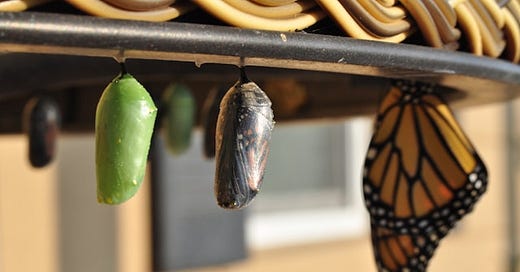





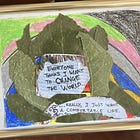

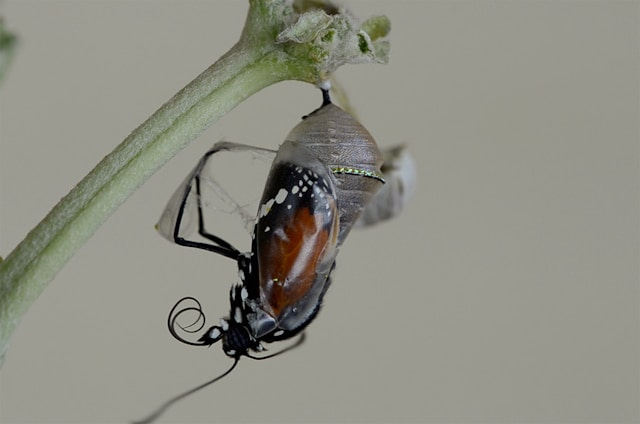

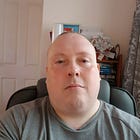
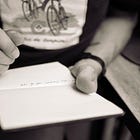

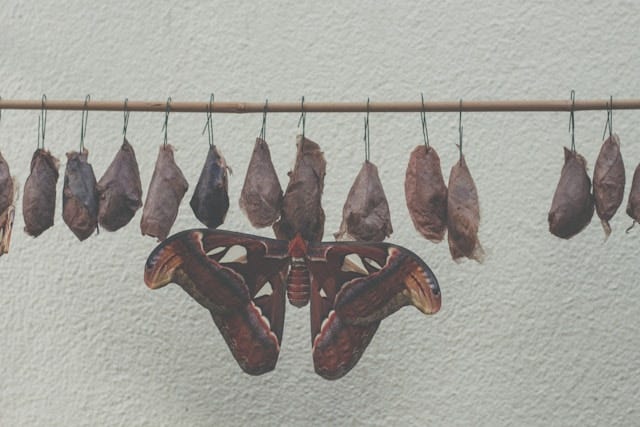

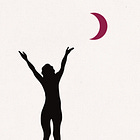


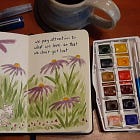


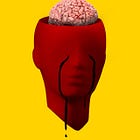
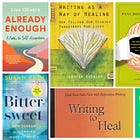
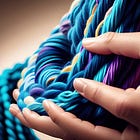
I have saved this, and I'm going to come back to it. I really appreciate your compilations, because they make it easier to quickly find what's of interest!